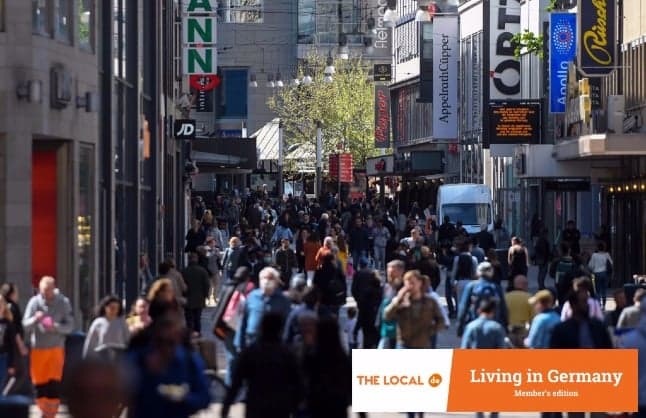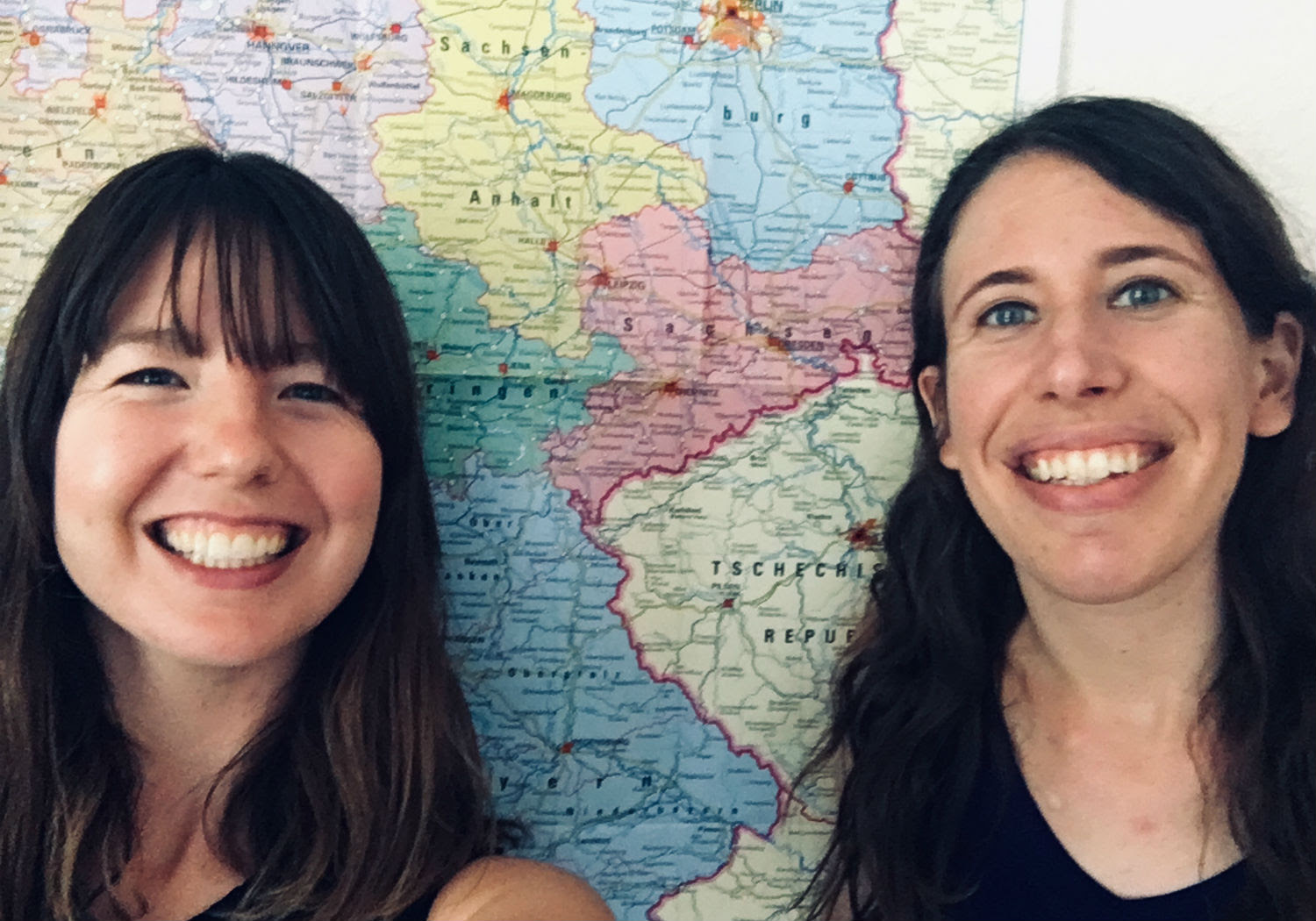Living in Germany: Being free from small talk, borders and moving German public holidays

Each week the team at The Local Germany sends out a weekly members' newsletter looking at some of the quirks, perks and big issues for people living in the country.
Tweet of the week
Save for maybe discussing dreary weather, “small talk” isn’t really a concept that exists in Germany. That means that “awkward silence” is not exactly a thing either, as there’s no pressure to fill conversation gaps - or initiate a chat in the first place, as one American English teacher and travel guide in Görlitz noted.
I just rode three hours in a car with a German who had no expectation of, or desire to make small talk. It was such a relief!
— Tessa Approves in Görlitz (@tessaapproves) September 27, 2020
Is this also a relief to you? How do Germans initiate conversations differently than in your home country?
Reunification Day
Saturday October 3rd officially marked 30 years since East and West Germany became one united country on October 3rd 1990. Even in corona times, several events are slated in Berlin to mark the momentous occasion, such as a series of illuminated monuments throughout the city.
One of the most impressive displays is seen at the famous Brandenburg Gate, the symbol of the Berlin Wall’s fall and the cohesiveness of the country in the years that followed.
This historic photo shows Germans gathering in front of it the night that the Berlin Wall fell on November 9th 1989.

Photo: DPA
Readers have their say
This year October 3rd fell on a Saturday. It meant all shops were closed – and there is no public holiday during the week. We asked The Local readers if Germany should change this system to make sure public holidays fall on weekdays… here’s the verdict:
QUICK POLL: Unlike some other countries, Germany does not transfer public holidays that fall on the weekend to a weekday. Should this change? (Germany Unity Day is this Saturday October, 3rd)
— The Local Germany (@TheLocalGermany) October 1, 2020
Keep in mind many shops across Germany will be opening on Sunday October 4th instead so you can (hopefully) stock up on milk and bread then.
Where is this?

Located in the student city Ulm, Baden-Württemberg, the Ulm Minster holds the title of tallest church in the world - at least until the Sagrada Family in Barcelona is eventually completed.
It’s also the fifth tallest structure to be built before the 20th century, with a steeple measuring 161.5 metres. It’s no wonder that the structure is often erroneously called a cathedral, when it’s actually classified as a church.
Local Germany editor Rachel Stern craned her neck to see the top upon a visit in September. But the impressive work of architecture wasn’t the only allure to the city bordering Bavaria.
It’s also filled with cosy restaurants filled with regional mouthwatering regional food like Maultauschen dumplings and has a picturesque Altstadt situated along the Danube river.
Did you know?
Germany shares a border with nine other countries: Denmark, Poland, the Czech Republic, Austria, Switzerland, France, Belgium, Luxembourg and the Netherlands.
Prior to 2020, it was easy to take for granted the ease of crossing borders - sometimes even accidentally - into a neighbouring country. Yet at the moment, Germany is placing greater importance on these dividing lines, and issuing travel warnings to several of its surrounding nations.
As of Friday, Poland remained the only Nachbarland which the Robert Koch Institute (RKI) had not categorised partially or fully as a risk area.
A reader's view
We published an article this week about how the Berlin Brandenburg airport is slated to open at the end of October, following a 12 year delay.
Yet one of our readers wrote to us to correct our labeling of EasyJet as a "British” airline. It actually has a deeper connection to Germany than many people might assume, she said.
“I’m working for EasyJet and had a tour of the building on the day the article was released. It’s exciting to see it tantalisingly close to actually opening!” wrote a reader who wanted to remain anonymous.
The only thing I was saddened to see was the labelling of easyJet as a no-frills British airline. The subsidiary company that operates in Berlin, easyJet Europe, is actually registered Austrian and here in Germany we operate on German contracts. We’re quite separate now from the British company.
This idea of a British airline taking over from Air Berlin (which went bankrupt in 2017) has really hurt our prospects with locals choosing the obviously German airline options. This is despite our cabin crew being required to speak German within their first year and much of our management being locals.”
Thanks for reading,
The team at The Local Germany

Rachel Loxton & Rachel Stern
Comments
See Also
Tweet of the week
Save for maybe discussing dreary weather, “small talk” isn’t really a concept that exists in Germany. That means that “awkward silence” is not exactly a thing either, as there’s no pressure to fill conversation gaps - or initiate a chat in the first place, as one American English teacher and travel guide in Görlitz noted.
I just rode three hours in a car with a German who had no expectation of, or desire to make small talk. It was such a relief!
— Tessa Approves in Görlitz (@tessaapproves) September 27, 2020
Is this also a relief to you? How do Germans initiate conversations differently than in your home country?
Reunification Day
Saturday October 3rd officially marked 30 years since East and West Germany became one united country on October 3rd 1990. Even in corona times, several events are slated in Berlin to mark the momentous occasion, such as a series of illuminated monuments throughout the city.
One of the most impressive displays is seen at the famous Brandenburg Gate, the symbol of the Berlin Wall’s fall and the cohesiveness of the country in the years that followed.
This historic photo shows Germans gathering in front of it the night that the Berlin Wall fell on November 9th 1989.

Photo: DPA
Readers have their say
This year October 3rd fell on a Saturday. It meant all shops were closed – and there is no public holiday during the week. We asked The Local readers if Germany should change this system to make sure public holidays fall on weekdays… here’s the verdict:
QUICK POLL: Unlike some other countries, Germany does not transfer public holidays that fall on the weekend to a weekday. Should this change? (Germany Unity Day is this Saturday October, 3rd)
— The Local Germany (@TheLocalGermany) October 1, 2020
Keep in mind many shops across Germany will be opening on Sunday October 4th instead so you can (hopefully) stock up on milk and bread then.
Where is this?

Located in the student city Ulm, Baden-Württemberg, the Ulm Minster holds the title of tallest church in the world - at least until the Sagrada Family in Barcelona is eventually completed.
It’s also the fifth tallest structure to be built before the 20th century, with a steeple measuring 161.5 metres. It’s no wonder that the structure is often erroneously called a cathedral, when it’s actually classified as a church.
Local Germany editor Rachel Stern craned her neck to see the top upon a visit in September. But the impressive work of architecture wasn’t the only allure to the city bordering Bavaria.
It’s also filled with cosy restaurants filled with regional mouthwatering regional food like Maultauschen dumplings and has a picturesque Altstadt situated along the Danube river.
Did you know?
Germany shares a border with nine other countries: Denmark, Poland, the Czech Republic, Austria, Switzerland, France, Belgium, Luxembourg and the Netherlands.
Prior to 2020, it was easy to take for granted the ease of crossing borders - sometimes even accidentally - into a neighbouring country. Yet at the moment, Germany is placing greater importance on these dividing lines, and issuing travel warnings to several of its surrounding nations.
As of Friday, Poland remained the only Nachbarland which the Robert Koch Institute (RKI) had not categorised partially or fully as a risk area.
A reader's view
We published an article this week about how the Berlin Brandenburg airport is slated to open at the end of October, following a 12 year delay.
Yet one of our readers wrote to us to correct our labeling of EasyJet as a "British” airline. It actually has a deeper connection to Germany than many people might assume, she said.
“I’m working for EasyJet and had a tour of the building on the day the article was released. It’s exciting to see it tantalisingly close to actually opening!” wrote a reader who wanted to remain anonymous.
The only thing I was saddened to see was the labelling of easyJet as a no-frills British airline. The subsidiary company that operates in Berlin, easyJet Europe, is actually registered Austrian and here in Germany we operate on German contracts. We’re quite separate now from the British company.
This idea of a British airline taking over from Air Berlin (which went bankrupt in 2017) has really hurt our prospects with locals choosing the obviously German airline options. This is despite our cabin crew being required to speak German within their first year and much of our management being locals.”
Thanks for reading,
The team at The Local Germany
 |
Rachel Loxton & Rachel Stern |
Join the conversation in our comments section below. Share your own views and experience and if you have a question or suggestion for our journalists then email us at [email protected].
Please keep comments civil, constructive and on topic – and make sure to read our terms of use before getting involved.
Please log in here to leave a comment.